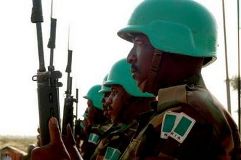AU peacekeepers ready to hand Darfur over to UN
July 16, 2006 (KALMA CAMP) — Some 95,000 people who fled Darfur’s violence are crowded into this labyrinth of huts scavenged from whatever is available _ tree branches, plastic sheeting, scrap metal.
 They have found only relative safety in Kalma camp, which offers a grim illustration of the challenges faced by an undermanned, underequipped African Union mission sent to try to help civilians caught up in civil war. Some A.U. troops say they have failed. A.U. commanders on the ground and officials at headquarters in Ethiopia refused to comment for this report. But the A.U. has officially embraced the proposition that it be replaced by a larger, more robust U.N. force. The Sudanese government, though, has so far balked at allowing a U.N. mission.
They have found only relative safety in Kalma camp, which offers a grim illustration of the challenges faced by an undermanned, underequipped African Union mission sent to try to help civilians caught up in civil war. Some A.U. troops say they have failed. A.U. commanders on the ground and officials at headquarters in Ethiopia refused to comment for this report. But the A.U. has officially embraced the proposition that it be replaced by a larger, more robust U.N. force. The Sudanese government, though, has so far balked at allowing a U.N. mission.
Ethnic African rebel groups rose up against the Arab-led Khartoum government in early 2003. The government is accused of responding by unleashing Arab militias known as the janjaweed who have been accused of some of the conflict’s worst atrocities _ but it denies those charges. Fighting continues despite a peace agreement the government and the main rebel group signed in May.
Armed men roam just outside Kalma, and young women who venture out in search of firewood have been raped. The marauders have even made raids inside Kalma. On one occasion, men on horseback reportedly entered the camp saying they were searching for stolen cattle, and shot and killed a man.
Aid workers report looters who prize the water pumps at the camp’s wells are growing increasingly brazen. In a recent raid on one of the wells, usually guarded by men armed with little more than sticks to ward off snakes, looters arrived firing automatic rifles. Sudanese police stationed just outside heard the gunfire and began firing at random. No one was hurt.
Kalma’s residents refuse to allow in Sudanese police, trust shredded by the war. That leaves only AU civilian police, who are not allowed under the mission’s mandate to be armed. The A.U. police can investigate incidents, but can only turn evidence over to Sudanese police for prosecution.
The A.U. has 7,000 men and women in Darfur, a region of 150,000 square miles (388,500 square kilometers), roughly the size of France, where punishing heat and frequent sandstorms take their toll on troops and equipment.
Only about 400 A.U. security officers are assigned to the sector that includes Kalma, and they patrol the camp only sporadically _ when armed A.U. troops are available to protect civilian police. Patrols were suspended altogether for more than a month after a May 8 riot in the camp in which a Sudanese interpreter working for the AU was killed and an A.U. office looted.
The riot was a dramatic expression of the anger camp residents often direct at the A.U., which they charge does too little to protect them.
“I want to go home because we have failed here and the United Nations needs to come in and take over this failed job,” one Nigerian soldier in the A.U. contingent, speaking on condition of anonymity for fear of being punished, told The Associated Press. “The people don’t even want us here …. They have absolutely no respect for us and I am tired of this.”
Aid groups, who need security to do their work, have been less harsh, saying the A.U. troops have made a difference, but are spread too thin and lack crucial equipment.
No one seems to have enough of what they need, whether it’s radios or helicopters. In a region where it can take nearly three hours to travel 60 kilometers (40 miles) because of loose sand, there are too few Russian-made transport helicopters. When the rains that are expected anytime now come, the logistics situation will only worsen, and the need for reliable air transport will dramatically increase.
The authority to act also is in short supply. A.U. soldiers may only fire when fired upon and given authorization to do so.
“Mandates are made by the bodies that authorize them,” said John Prendergast, an Africa analyst with International Crisis Group. “The AU should enhance its mandate much more than it has, but hasn’t because of resistance from Khartoum. The U.N. will face the same problem if it ever gets approval from Khartoum to come. The ideal mandate would be one that focuses on the protection of civilians, the disarmament of the janjaweed and support to returnees to their home villages.”
While the U.N. may come in with more troops and equipment, it may have no more power to act. But in Kalma, many place their hopes on the U.N.
“I appreciate the A.U., but I want the U.N. here because the A.U. has no power,” Sheik Ali Abdirahman Tahir, head of all the local leaders in Kalma, said through a translator. “The U.N. has the resources to get the job done and we need this because the A.U. has not been able to accomplish anything.”
(AP)
